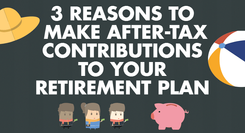Related Posts
Employers and Organizations
Does Financial Wellness Increase On-time Retirement?
Last Update: March 16, 2021
Capital One and United Income1 looked at data on retirement-aged Americans and found that 20 percent who are above retirement age are still working – a number that has doubled since 1985.
Experts predict that working past retirement is a growing trend:
- This rate is likely to rise by 2.5 percent by 2026
- By 2026, 10 percent of Americans over 75 will still be working2
- 59 percent of those nearing retirement plan on working past retirement age, with 26 percent planning to work until they are at least 703
The reason behind late retirement and low retirement savings is a general lack of proper financial education.
What is Financial Wellness?
Financial wellness is more than just financial literacy. It is a multidimensional concept that combines knowledge of financial concepts with the ability and desire to make intelligent financial decisions within one’s means.
This means that financial wellness doesn’t have to do with the amount of money a person makes or the level of job they have.
An entry-level worker, just as with a CEO, could be financially well as long as they can understand their financial choices and make smart financial decisions.
On the other hand, employees who do not have the knowledge, desire, or ability to make smart financial decisions can find themselves financially stressed.
The primary financial mistakes that cause late retirement include:
#1: Didn’t Take Full Advantage of the Company 401(k)
Company pensions have largely been replaced by a 401(k) benefit. The differences between the two programs are substantial. One of the biggest differences: the 401(k) requires employees to make the investment decisions.
| Pension | 401(k) |
| Employer determines how much money to put into the pension from the employee’s paycheck. | Employees determine how much to contribute to their retirement plan and how often. Employees also determine if this happens automatically. |
| Employer invests pension money. | Employee determines where to invest the 401(k) funds and what risk levels to take |
| Employer informs employee how much money they will receive each month upon retirement. | Employee decisions about how much to invest and where to invest determine how much money is in the retirement fund. The employee then determines how to distribute the funds upon retirement. |
| Employer specifies date of retirement. | Employees determine when they will retire based on personal factors. |
People who are not financially well often make the wrong financial decisions. For instance, studies show:
- Millennials choose student loan repayment over retirement savings despite the benefit of compound interest. Morningstar suggests that an employee can have a $1 million nest egg by 65 by saving $381 a month. That number jumps to $1,920 a month if an employee begins saving at 454. Saving early for retirement makes a huge difference.
- One out of four employees does not participate in 401(k) company matching when offered, giving up $24 billion each year5 that could've gone into their retirement account.
- 29 percent of Americans have taken a 401(k) loan. Unfortunately, 57 percent decreased their contributions to their 401(k) while paying back the loan. This reduced their savings as well as earning potential6.
Financially well employees understand how to evaluate their retirement savings, use the 401(k) match, begin saving early, use a budget to save for retirement while paying off other debt and/or saving for big purchases, and follow appropriate strategies to make up for any retirement saving deficits.
#2: Didn’t Save Enough Money in Their Retirement Accounts Before Retirement
In 2019, the Survey of Consumer Finances7 showed that the average retirement savings balance for American families is just $255,130. EBRI8 says that these numbers show that American workers should have $4.4 trillion more in their retirement accounts than they do. And as the American lifespan increases, savings need to be even higher.
According to the Center for Retirement Research9, working into the retirement years is not a great strategy. They found that over one-third (37 percent) of those who planned to continue working had to retire early, often due to medical issues.
Financially well employees are more likely to retire on time because they:
- Create budgets that reflect a desire to save and invest while reducing debt
- Learn about investing and risk management and use that knowledge to create a retirement savings portfolio
- Understand how much money they need in retirement accounts and how long their current savings will last
- Take advantage of compound interest
#3: Assumed Social Security Would Cover Retirement
From the beginning, Social Security was to be a retirement supplement. However, the Social Security Administration10 shows that half of the single retirees and 21 percent of married couples count on this benefit to provide 90 percent or more of their retirement income. Unfortunately, the average social security benefit is about the same as the income earned at a minimum wage job.
For those retiring in the future, Social Security benefits will be even less, and the age to receive benefits will continue to rise.
Financially well employees understand the purpose of Social Security benefits, know their monthly benefit amount, and create a financial plan that includes Social Security as part of their income rather than the entirety of their income.
#4: Accumulated Too Much Debt Before Retirement
A recent Enrich and Wellable survey found that 20 percent of seniors fell into the financially unwell category. One reason for this designation is debt. Based on 2019 Experian data11, we see that American employees have a considerable amount of debt, even into retirement years.
- 18 to 23: $9,593
- 24 to 39: $78,396
- 40 to 55: $135,841
- 56 to 74: $96,984
- 75 and above: $40,925
When combined with a lack of retirement savings, this debt can leave seniors unable to retire on time.
Financially well seniors understand how to create budgets and emergency savings accounts that reduce the need for excessive consumer debt.
They also understand the need to pay down debt as quickly as possible and avoid debt repayment options, such as 401(k) loans, leading to penalties, reducing interest, and reducing earning potential.
If we are to stop delayed retirement from becoming an even bigger problem, we must give people the education and tools to empower themselves to get back on track.
1 - https://unitedincome.com/documents/papers/United_Income_Older_Americans_in_the_Workforce.pdf
2 - https://www.bls.gov/news.release/ecopro.nr0.htm
3 - https://www.myirionline.org/docs/default-source/research/boomer-expectations-for-retirement-2016.pdf
4 - https://www.kiplinger.com/slideshow/retirement/t047-s001-retirement-mistakes-you-will-regret-forever/index.html
5 - https://financialengines.com/education-center/wp-content/uploads/2016/07/Financial-Engines-401k-Match-Report-050615.pdf
6 - https://www.shrm.org/resourcesandtools/hr-topics/benefits/pages/401k-loan-trends.aspx
7 - https://www.federalreserve.gov/econres/scfindex.htm
8 - https://www.ebri.org/content/retirement-savings-shortfalls-evidence-from-ebri-s-2019-retirement-security-projection-model
9 - https://crr.bc.edu/briefs/retiring-earlier-than-planned-what-matters-most/
10 - https://www.ssa.gov/news/press/factsheets/basicfact-alt.pdf
11 - https://www.experian.com/blogs/ask-experian/research/consumer-debt-study/
Featured Posts

Employers and Organizations
3 MIN
10 Simple Ways Benefits Managers Can Recession-Proof Their Employee Benefits Package

Employers and Organizations
3 MIN
3 Reasons to Make After-Tax Contributions to Your Retirement Plan

Employers and Organizations
4 MIN
Financial Information vs Employee Behavior Change: Which Is More Important for Your Company’s Financial Wellness Program?

Employers and Organizations
3 MIN
Does Your Employee Financial Wellness Program Take Mindset Into Consideration?
Related Posts

Employers and Organizations
3 MIN
How Financial Wellness Programs Help Employees Retire On Time

Employers and Organizations
2 MIN
New Principal Study Finds Alarming Concerns for Workers Nearing Retirement

Employers and Organizations
3 MIN
The #1 Most Effective Way to Increase Employee Retirement Saving
